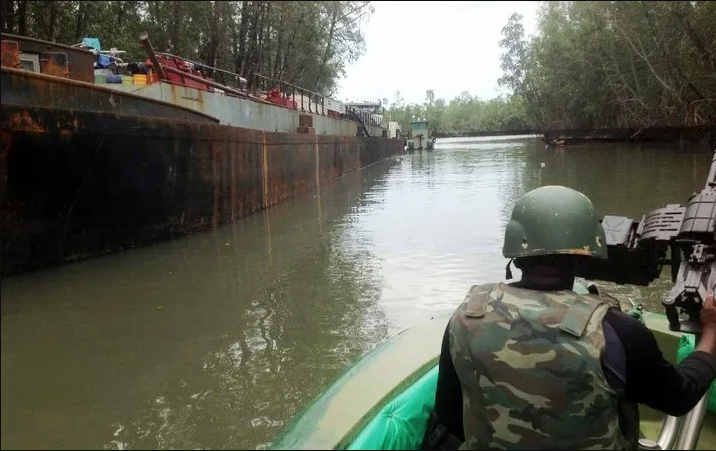Intelligence gathering and military operations have resulted in the arrest of 210 suspects in the Niger Delta for crude oil theft.
The Minister of Information and Culture, Alhaji Lai Mohammed, stated this yesterday in Abuja at a meeting with officers of the Nigerian National Petroleum Company Limited (NNPCL) at the end of his tour some hydrocarbon installations on the Trans-Niger Pipeline, Nembe Creek Trunk Line and Bonny Oil and Gas Terminal that have been under force majeure since March 2022. He said 365 illegal refining sites were destroyed, with about 1,054 refining ovens, 1,210 metal storage tanks, 838 dugout pits, and 346 reservoirs destroyed.
The minister added that the continued campaign by the military has also led to the confiscation of 20.2 million litres of AGO, 461.8 thousand litres of petrol, 843.6 thousand litres of DPK, and 383.5 thousand barrels of crude oil.
Classifying the estimated loss of 700,000 barrels of oil per day in the Niger Delta from theft and production shut in as an existential threat to the country, Mohammed reiterated the determination of federal government to put an end to oil theft from the activities of vandals and economic saboteurs which have severely impacted Nigeria’s crude oil and natural gas production.
“We have witnessed first-hand a number of illegal refineries destroyed by our military in the course of our aerial surveillance.
“Several vehicles, crude mining and bunkering equipment like speed boats, wooden boats, market boats, trucks and tankers have been confiscated by the government security agencies,” Mohammed said.
Meanwhile the NNPC has set up a central command and control centre to enable it effectively carry out a real time monitoring of petroleum activities including movement of all vessels within the Nigerian Exclusive Economic Zone.
The General Manager National Investment Management Services (NAPIMS), a subsidiary of NNPCL, Bala Wunti, stated this while briefing the minister.
He said the control centre has also launched the Crude Sales Document Validation Portal to enable the public to validate all crude sales, particularly those illegally exported.
“The thinking is that a lot is being exported. If it is exported it is illegal crude. Yesterday the GCO in New York asked the international community to declare that kind of crude as blood oil. And for us to be able to make sure we do that we have to set up what we call crude validation portal,” Wunti said.
He said the portal will ensure that all the crude oil exported from Nigeria has an entry number that will enable a potential buyer to get details about the quantity and genuineness of such a product by using a special code available on the portal for verification.
He said over 97 incidents have been reported on the portal, while a whistle blower portal also allows the public to report unwholesome activities. According to him, 35 whistle blowers are reported on the average daily.

